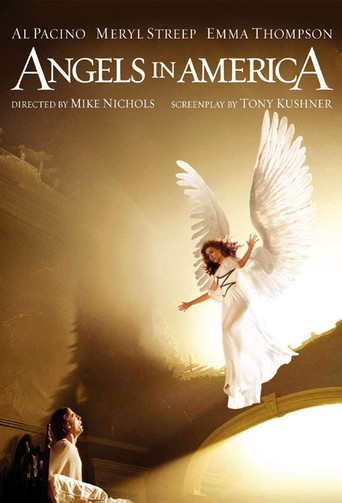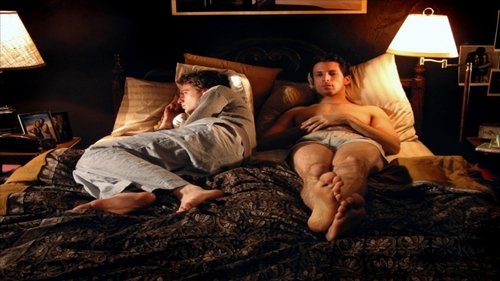


one of my absolute favorites!
... View MoreClever and entertaining enough to recommend even to members of the 1%
... View MoreThe movie turns out to be a little better than the average. Starting from a romantic formula often seen in the cinema, it ends in the most predictable (and somewhat bland) way.
... View MoreOne of the film's great tricks is that, for a time, you think it will go down a rabbit hole of unrealistic glorification.
... View MoreThe mini-series Angels in America is a story of epic proportions, the playwright re-written into a screenplay by the original writer Tony Kushner, has multiple stories connecting through the deadly disease of AIDS, takes them on a journey of discovery through hallucinations of angels. The entire cast give a stunning performance, with actors like Meryl Streep, Jeffrey Wright, Justin Kirk and Emma Thompson playing up to two to three roles, giving the film that extra little bit of magic. Each character has a story that we follow through out, with every character relating in someway to sexuality, following confusion, acceptance and frustration. On top of it all is the wonderful score by Thomas Newman, who scored such films as "American Beauty" and "The Shawshank Redemption", Newman takes you on a magical flying carpet ride through a world of almost cinema, giving the television series a strong beating heart that will stay with you for a long time.The story is in 6 chapters rolled over in two 3 hour episodes, which gives the series a triumphant legacy, as a part of HBO's outstanding library of film, television and documentaries. This is truly a major milestone in cinematic history and should be recognized for it sheer emotion and storytelling.
... View MoreAlthough this movie was based on a good concept, it was overdone and extraordinarily long and boring. I wish I had spent my time watching paint dry.Although the context was great, the movie was slow to the point of comatose.They really needed to compact the show a lot because it lost SO much in the watching... and waiting.Where they got it right was in having the same actors doing multiple scenes - that was really interesting and fun.The acting was excellent but it was WAY to overextended.My husband and I didn't even watch it until the end - it was that boring. I insisted that we do just to say we did but we will be "donating" this movie to anybody that actually wants to see.
... View MoreWith 250+ reviews already, I'm probably not adding much to the conversation, yet I need a place to say it, so here it is.I've seen the stage version, and I've seen the film three times. And I really do not see what the fuss is about. I've tried, but I don't see it.It's not a bad film, and earned its 7/10 from me. It has good music, good acting, and acceptable effects.But I have a big problem with the writing. I found it to be overlong, without delivering a clear message, and too much directed like a filmed play, rather than a serious film.The angels in particular were among the most idiotic things I've seen in a long time. In a way, I guess that's appropriate, but just didn't fit with the rest of the film. If you edit all that out, I think you could get a better film. Of course, the title would have to go...I also found that the use of Roy Cohn and Ethel Rosenberg didn't fit. Why put a real man as a lead in a fictional film? It's not responsible. There was no Joe Pitt, and he never worked for a 2nd Circuit justice. It all unravels from there. If you're in fiction, it's best to stay there. If you're in docudrama, try to stick to the truth.Themes in this film are gay men and: AIDS, 1980s USA, Republicans, Mormons, the closet.While I have seen better films on gay men and AIDS (In the Gloaming, And the Band Played On) and closeted gay Republicans (Outrage) I haven't yet seen a film that covers as much ground as this one, or that covers the 80s as well. On the other hand, I know there are many significant ones I haven't seen, and I do expect I'll find one better than this.Anyway, I do admire the attempt, and the result is worth watching, although not great.
... View MoreAs I suspect is true of most of the people who assigned this film ten stars, I am a huge fan—yea, verily, a devotee—of the *play* "Angels in America." When I heard that HBO was turning it into a miniseries, I was duly thrilled, and that excitement carried me through my first viewing of the broadcast with only a minor sense of letdown. I recently re-watched the film over several evenings, and with the added distance of several years, my disappointment in the film is stronger. The play deserved a better screen adaptation than this.The acting, I'm pleased to say, isn't one of the major problems. With one exception, the cast do a fantastic job. I don't have the space to single out every actor for the praise they deserve, but I do have to make special mention of Jeffrey Wright's Belize (Ma cherie bichette!) and Meryl Streep's Ethel Rosenberg. The one weak link in this cast is Emma Thompson. She's reasonably believable as the Angel, though hardly an obvious choice. But she's too British to pull off Emily, the Italian American nurse (she doesn't even remember to keep up the accent), and she's too posh to play the psychotic homeless woman (again, accent). If you're going to do the actors-playing-multiple-roles thing, then Thompson needs to work in all three roles.The film's biggest problems lie in the directing and possibly the editing. The pacing is spotty, especially in Part 1. Some scenes play out too slowly: for example, Roy Cohn's first scene, with the phone, which isn't as frenetic as it's supposed to be; or the "quartet" scene, where we watch the two couples—Harper and Joe, Prior and Louis—in overlapping crisis. Other scenes play out too fast: the first meeting of Joe and Louis in the washroom, for instance, which moves too quickly to build up much sexual tension between them.There are missteps in tone right from the beginning of the film. The rabbi's opening monologue is too light, too feel-good, too Hallmark channel or Steven Spielberg. And the confessional scene between Louis and the rabbi shortly afterward, which works on a stage with minimal scenery, becomes unbelievable when it's placed at the cemetery entrance, with people passing behind and a whole row of rabbis listening in—and the coffin, the central presence in this scene as originally written because it symbolizes Prior's mortality and reminds us that Louis is a person who abandons people who have claims on his love, nowhere to be seen.But the biggest problems with tone surround the Angel's appearances. Kushner warns in his playwright's notes that unless "the director and designers invent great, full-blooded stage magic," the results will be "disappointing" and "ineffectual." Now, on a stage, in a live theater, the special effects used in this film would have more than fit the bill for "great, full-blooded stage magic." But on screen, in the age of CGI, the special effects didn't come across as that spectacular. A major failing here—paradoxically—is Nichols's insistence on using wide shot to show us the scale of what they created. Again, I'm sure that live, on set, the staging of the Angel's appearances looked amazing. But on screen, it just looks like Emma Thompson hanging from a cable way up in the air (and wriggling around in a funny way) in a room with abnormally tall ceilings. Sci-fi has spoiled us, Nichols. Unless you have the budget to compete with the scale of a CGI blockbuster, don't try. I'm willing to bet money that designing special effects on a smaller scale, relying more heavily on close-ups to fill our vision with wonder, would have produced more spectacular results. This would have been especially important in the wrestling scene, which is supposed to be deathly serious but was so over-the-top that it actually ended up coming across as slapstick.I have a similar complaint regarding the use of sex in the Angel's appearances. The Angel wasn't a convincing erotic presence because we were shown too much. Wide shots of the Angel and Prior copulating in mid-air wreathed in fire, or the Angel and Hannah locking lips and thrashing around amid fireworks, weren't as impressive as I'm sure they sounded on paper. It just looked, to borrow a line from the script, ungainly. Again, close-ups—glimpses of naked flesh, eyes and mouths in ecstasy—would have been more effective. The close-in shot of Hannah falling back onto the bed in post-coital bliss was more emotionally powerful, and a more striking piece of stage magic, than the wide shot that preceded it.Some final remarks about Kushner's rewrites for the screenplay: I regret the loss of the magic realist scene in the Mormon Visitors Center, between Harper and Prior—but I'm prepared to sigh and say, "Well, you can't preserve everything, that's why the movie's never as good as the original." The additional scene between Hannah and Joe near the end of the movie, at the entrance to the subway, was a worthy addition, an excellent way to provide more closure for Joe's storyline. Throughout the movie, religion was more prominent than it had been in the play: Hare Krishnas chanting in the street, the gospel choir at Belize's friend's funeral, the apparently Amish choir outside the subway. That added a nice dimension to the work. I am baffled, though, by the unhelpful additions to the scene between Hannah and Joe at the Visitors Center, and that trite line about "Hold to what you believe" is...an embarrassing stain.I'm probably coming across as a perfectionist. But "Angels in America" is an outstanding work that deserves perfection. I've seen films so good I'm prepared to hail them as perfect. I would really have liked this to be one of them, but it wasn't.
... View More